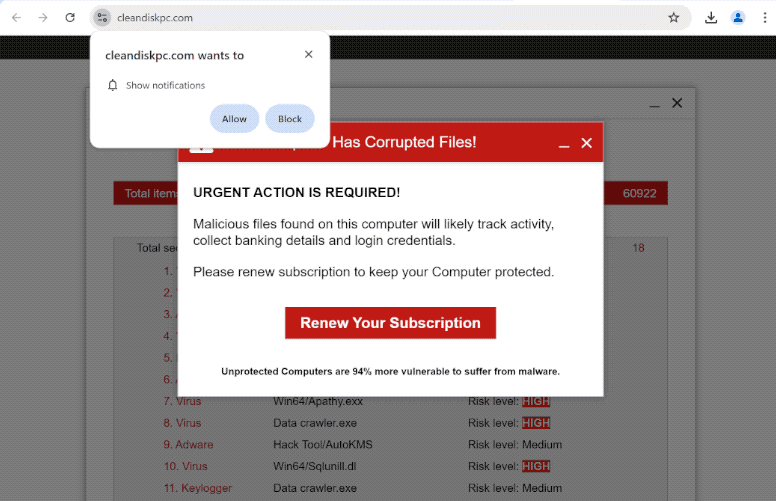How to stop cleandiskpc.com notifications
cleandiskpc.com is a scam website that not only shows a fake virus alert but also tries to trick users into allowing ads on the desktop. When you get redirected to the site, you will see a warning that your computer has malware on it and that you are being tracked. A browser alert also appears saying “cleandiskpc.com wants to show notifications”. The site is misusing a legitimate browser feature that allows sites to ask for permission to show users notifications on the desktop. If given permission, cleandiskpc.com would just spam ads.
cleandiskpc.com is a very generic website that has very little content on it. When you get redirected to it, you will see a fake virus alert claiming your computer has malicious files on it, which are supposedly tracking your activity. A fake virus scan will also be shown, with results displaying tens of infections. The site asks that you renew your anti-virus subscription. The site is likely trying to phish personal and financial information, so engaging with the pop-ups is a bad idea.
The site will also prompt the browser to show an alert saying “cleandiskpc.com wants to show notifications”. Clicking “Allow” on the “cleandiskpc.com wants to show notifications” alert will essentially authorize the site to show ads on your desktop. The ads will appear as notifications on the right side of your screen, even when you’re not on the site itself. The ad notifications may purposely be made to look like system alerts to trick users into engaging with them. If you have authorized the site to show notifications, do not interact with them. The sites could lead you to potentially dangerous websites that conceal malware or promote scams. Fortunately, the permission to show notifications can be revoked in the browser’s settings very easily. If you need help, you can find instructions at the end of this report.
Why are you redirected to sites like cleandiskpc.com
Most commonly, redirects to random sites like cleandiskpc.com are either a sign of an adware infection or it just means users browse high-risk websites without an adblocker. The latter is usually the case. Many websites bombard users with questionable ads. For example, sites that have pirated and/or pornographic content will often trigger a redirect when users click on anything. Fortunately, these redirects are easily blockable with an adblocker program.
It’s also possible for the redirects to be a sign of an adware infection. Adware is a minor infection and primarily aims to expose users to as much advertisement content as possible. These types of infections get installed via the software bundling method. They come attached to free programs as extra offers and are authorized to be installed alongside without requiring explicit permission. The offers are technically optional but they are preselected to install. Users must manually deselect them but this is made difficult by the fact that the offers are hidden in settings users don’t usually use. This makes software bundling a rather controversial installation method. It’s also very common for anti-virus programs to detect programs that use software bundling as potential threats.
If you want to avoid installing junk, pay attention when installing programs. When given the option during installation, choose Advanced (Custom) settings. The installation window will recommend using Default but if you follow this advice, all added offers will be permitted to install. Advanced settings, on the other hand, will show you all offers and give you the option to deselect them. We always recommend deselecting all offers because legitimate programs do not use this method of installation.
How to stop cleandiskpc.com notifications
We strongly recommend scanning your computer with an anti-virus program like WiperSoft to check for an adware infection. Adware is rather tricky to deal with manually so using an anti-virus program is suggested. If nothing is detected, the sites you visit are likely the trigger for the redirects. To fix that, install an adblocker.
If you have given the site permission to show you notification, follow the instructions below to revoke the permission.
- For Mozilla Firefox: Open Menu (the three bars top-right corner) -> Options -> Privacy & Security. Scroll down to Permissions, press Settings next to Notifications, and remove cleandiskpc.com and any other questionable websites. You can permanently turn off these notification requests by checking the “Block new requests asking to allow notifications” box in the same Notifications settings.
- For Google Chrome: Open Menu (the three dots top-right corner) -> Settings -> Privacy and security -> Site Settings. Click on Notifications under Permissions, and remove cleandiskpc.com and any other questionable websites. You can stop these notification requests permanently by toggling off “Sites can ask to send notifications”.
- For Microsoft Edge: Open Menu (the three dots top-right corner) -> Settings -> Cookies and site permissions -> Notifications. Review which sites have permission and remove cleandiskpc.com and any other questionable websites. You can permanently turn off these notification requests by toggling off “Ask before sending”.
Site Disclaimer
WiperSoft.com is not sponsored, affiliated, linked to or owned by malware developers or distributors that are referred to in this article. The article does NOT endorse or promote malicious programs. The intention behind it is to present useful information that will help users to detect and eliminate malware from their computer by using WiperSoft and/or the manual removal guide.
The article should only be used for educational purposes. If you follow the instructions provided in the article, you agree to be bound by this disclaimer. We do not guarantee that the article will aid you in completely removing the malware from your PC. Malicious programs are constantly developing, which is why it is not always easy or possible to clean the computer by using only the manual removal guide.

